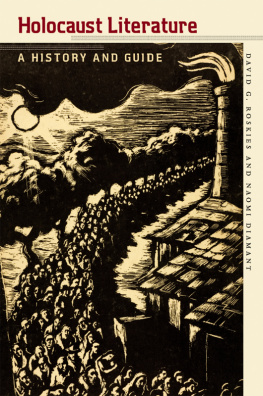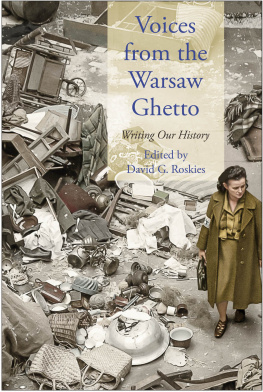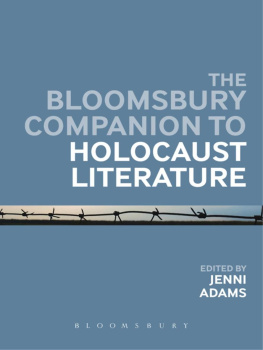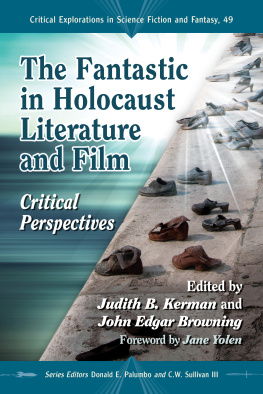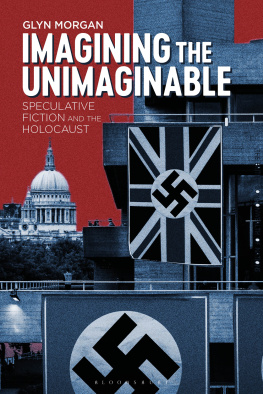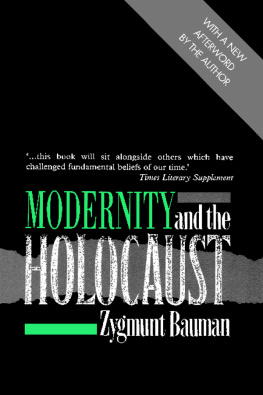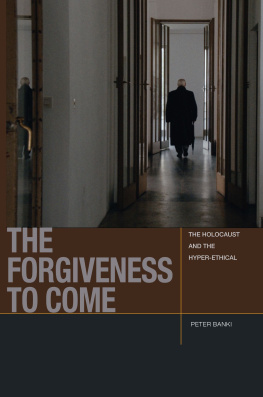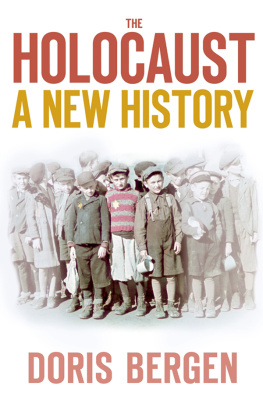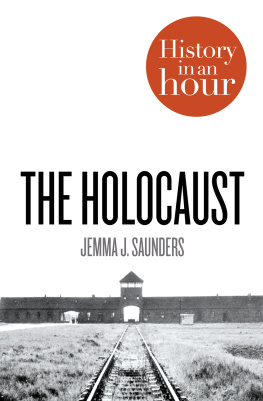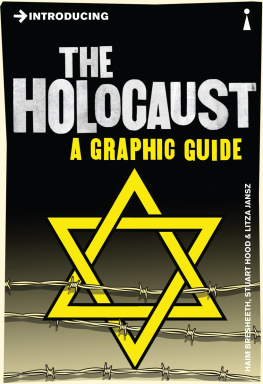David G. Roskies - Holocaust Literature: A History and Guide
Here you can read online David G. Roskies - Holocaust Literature: A History and Guide full text of the book (entire story) in english for free. Download pdf and epub, get meaning, cover and reviews about this ebook. year: 2012, publisher: Brandeis University Press, genre: Art. Description of the work, (preface) as well as reviews are available. Best literature library LitArk.com created for fans of good reading and offers a wide selection of genres:
Romance novel
Science fiction
Adventure
Detective
Science
History
Home and family
Prose
Art
Politics
Computer
Non-fiction
Religion
Business
Children
Humor
Choose a favorite category and find really read worthwhile books. Enjoy immersion in the world of imagination, feel the emotions of the characters or learn something new for yourself, make an fascinating discovery.
- Book:Holocaust Literature: A History and Guide
- Author:
- Publisher:Brandeis University Press
- Genre:
- Year:2012
- Rating:3 / 5
- Favourites:Add to favourites
- Your mark:
- 60
- 1
- 2
- 3
- 4
- 5
Holocaust Literature: A History and Guide: summary, description and annotation
We offer to read an annotation, description, summary or preface (depends on what the author of the book "Holocaust Literature: A History and Guide" wrote himself). If you haven't found the necessary information about the book — write in the comments, we will try to find it.
A comprehensive assessment of Holocaust literature, from World War II to the present day.
Holocaust Literature: A History and Guide — read online for free the complete book (whole text) full work
Below is the text of the book, divided by pages. System saving the place of the last page read, allows you to conveniently read the book "Holocaust Literature: A History and Guide" online for free, without having to search again every time where you left off. Put a bookmark, and you can go to the page where you finished reading at any time.
Font size:
Interval:
Bookmark:
THE TAUBER INSTITUTE SERIES FOR THE STUDY OF EUROPEAN JEWRY
Jehuda Reinharz, General Editor
Sylvia Fuks Fried, Associate Editor
Eugene R. Sheppard, Associate Editor
The Tauber Institute Series is dedicated to publishing compelling and innovative approaches to the study of modern European Jewish history, thought, culture, and society. The series features scholarly works related to the Enlightenment, modern Judaism and the struggle for emancipation, the rise of nationalism and the spread of antisemitism, the Holocaust and its aftermath, as well as the contemporary Jewish experience. The series is published under the auspices of the Tauber Institute for the Study of European Jewryestablished by a gift to Brandeis University from Dr. Laszlo N. Tauberand is supported, in part, by the Tauber Foundation and the Valya and Robert Shapiro Endowment.
For the complete list of books that are available in this series, please see www.upne.com
David G. Roskies and Naomi Diamant
Holocaust Literature: A History and Guide
Mordechai Altshuler
Religion and Jewish Identity in the Soviet Union, 19411964
Robert Liberles
Jews Welcome Coffee: Tradition and Innovation in Early Modern Germany
Sharon Faye Koren
Forsaken: The Menstruant in Medieval Jewish Mysticism
Nils Roemer
German City, Jewish Memory: The Story of Worms
David Assaf
Untold Tales of the Hasidim: Crisis and Discontent in the History of Hasidism
Jehuda Reinharz and Yaacov Shavit
Glorious, Accursed Europe: An Essay on Jewish Ambivalence
Eugene M. Avrutin, Valerii Dymshits, Alexander Ivanov, Alexander Lvov, Harriet Murav, and Alla Sokolova, editors
Photographing the Jewish Nation: Pictures from S. An-skys Ethnographic Expeditions
A Sarnat Library Book
HOLOCAUST LITERATURE
[A HISTORY AND GUIDE]
DAVID G. ROSKIES AND NAOMI DIAMANT
BRANDEIS UNIVERSITY PRESS
WALTHAM, MASSACHUSETTS
BRANDEIS UNIVERSITY PRESS
An imprint of University Press of New England
www.upne.com
2012 David G. Roskies
All rights reserved
The publication of this book was generously supported by the Lucius N. Littauer Foundation.
For permission to reproduce any of the material in this book, contact Permissions, University Press of New England, One Court Street, Suite 250, Lebanon NH 03766; or visit www.upne.com
Library of Congress Cataloging-in-Publication Data
Roskies, David G., 1948
Holocaust literature: a history and guide / David G. Roskies and Naomi Diamant.
p. cm.(The Tauber Institute series for the study of
European Jewry)
ISBN 978-1-61168-357-8 (cloth: alk. paper)
ISBN 978-1-61168-358-5 (pbk.: alk. paper)
ISBN 978-1-61168-359-2
1. Holocaust, Jewish (19391945), in literatureHistory and criticism. 2. Holocaust, Jewish (19391945)Influence. 3. Holocaust survivors BiographyHistory and criticism. I. Diamant, Naomi. II. Title.
PN56.H55R67 2012+
809.93358405318dc23 2012021083
Can the dead mourn the dead?
ZALMEN GRADOWSKI
The Czech Transport: A Chronicle of
the Auschwitz Sonderkommando
Survivors: your legacy of gladness should be tentative,
Some of us still flicker in the straits of death.
Dont forget to keep our dying in your breath.
Dont forget, your martyrdom now will be to live.
ABRAHAM SUTZKEVER
Epitaphs, translated by
C. K. Williams
On ne part pas de zro.
MICHEL BORWICZ
Ecrits des condamns mort sous
loccupation nazie, 19391945
A complete curriculum guide is available online
at www.brandeis.edu/tauber/roskies.html.
IN 1963, THE MONTREAL BRANCH OF THE JEWISH LABOR Bund marked the twentieth anniversary of the Warsaw ghetto uprising. Old-line Socialists, they commemorated the uprising by gathering on April 19, which fell on a Friday that year. No synagogue would host a secular event on the Sabbath, so they met in a school auditorium; the local Bundists had always gone their own way, since the time when they were the largest Jewish political party in Poland. I was fifteen years old, old enough to attend without my parents. My best friend Khaskl, who considered himself a Bundist and went to a Bundist summer camp in New York State, had brought me along.
There was no cantor to chant prayers in Hebrew, no prayers to a God that no one believed in anyway, and no concessions made to the Anglophones. Yiddish was the language spoken because the story happened to people who spoke Yiddish: the grandparents, parents, cousins, uncles, aunts, brothers, sisters, and comrades of the people sitting in the auditorium. That evening I heard about the heroic exploits of other ghetto fighters: not Mordecai Anielewicz but Abrasha Blum; not Mordecai Tenenbaum but Michal Klepfisz; of those who survived, not Antek Zuckerman and Zivia Lubetkin but Marek Edelman and Vladke Meed. Apparently, the Zionist and Bundist underground had been divided along party lines and joined forces only in the eleventh hour. This was a very different picture of the Warsaw ghetto uprising from the one I had learned at school, and I was now old enough to hear it, at a gathering that ended with the singing of two Yiddish hymnsthe Partisans Hymn, which I already knew and the Bundist hymn, which I didnt.
But nothing prepared me for the centerpiece of the evening: a dramatic reading of an epic poem by someone named Simkhe Bunem Shayevitsh, a martyred poet from the d ghetto. Abba Igelfeld, Khaskls uncle, read from a large printed folio. Abba had been a semiprofessional actor in his youth, and he had real stage presence. Un atsind, Blimele, kind-leb, he began in a sepulchral toneAnd now Blimele, my child, / Restrain your childish joy... , as if a father were interrupting an intimate conversation with his daughter to get her ready for the unknown road, because just now, in the dead of winter, theyve been ordered to leave their home, and besides packing what few belongings father, mother, and daughter can carry, they must also say goodbye to the thin wooden walls of their unheated ghetto room, to the table, the wardrobe, the conjugal bed, and above all the books, and there is just enough time to give Blimele instruction about those of her forebears who made similar journeys into the unknown, like Abraham of old, or like the poet Leivick who was exiled to Siberia, and Shayevitshs poem, I noticed, rhymed the way that Yiddish folk songs rhymed, and there wasnt one word or reference that eluded me, so simply was the poem written, for even if Id never heard of Tuwim or Yesenin, mentioned among the books that were being left behind, I could guess from the context that they were famous writers in some other language, and while Blimele was never taught the Torah directly, as a girl who grew up in a traditional home, I was old enough to know how Abraham leading Isaac to Mount Moriah and the prophet Jeremiah accompanying his people into exile were the biblical back story to the deportation of the Jews from the ghetto, and after Abba had been reading for a good fifteen minutes he raised his voice when the father said, Nor lomir nisht veynen, lomir nisht / yomern un lehakhis ale sonim / shmeykhlen, nor shmeykhlen, az vundern / zoln zey zikh vos yidn konenBut nows not the time to weep, / Not the time to lament, but to spite all our foes / Its time to break into a smile, yes a smile / To astonish them at what the Jews can do, and in the poets voice and through Abbas ventriloquism I recognized the call of Jewish defiance, the studied response of a stiff-necked, persecuted people.
Font size:
Interval:
Bookmark:
Similar books «Holocaust Literature: A History and Guide»
Look at similar books to Holocaust Literature: A History and Guide. We have selected literature similar in name and meaning in the hope of providing readers with more options to find new, interesting, not yet read works.
Discussion, reviews of the book Holocaust Literature: A History and Guide and just readers' own opinions. Leave your comments, write what you think about the work, its meaning or the main characters. Specify what exactly you liked and what you didn't like, and why you think so.

